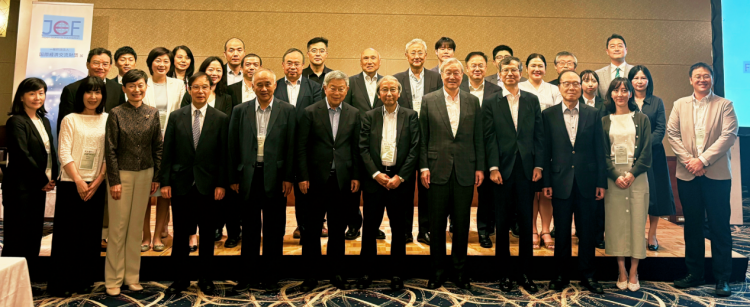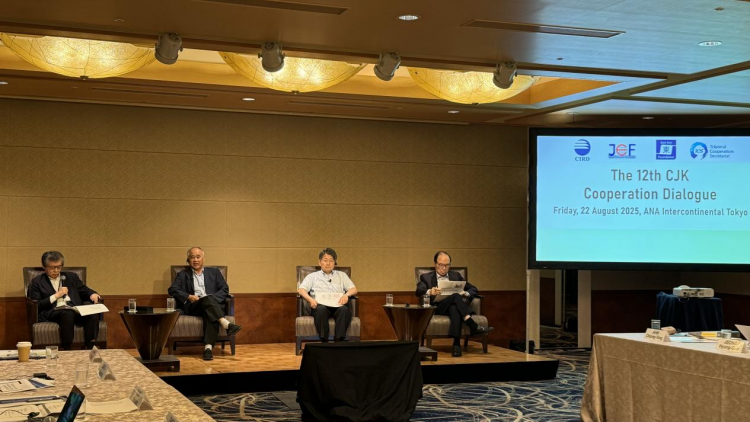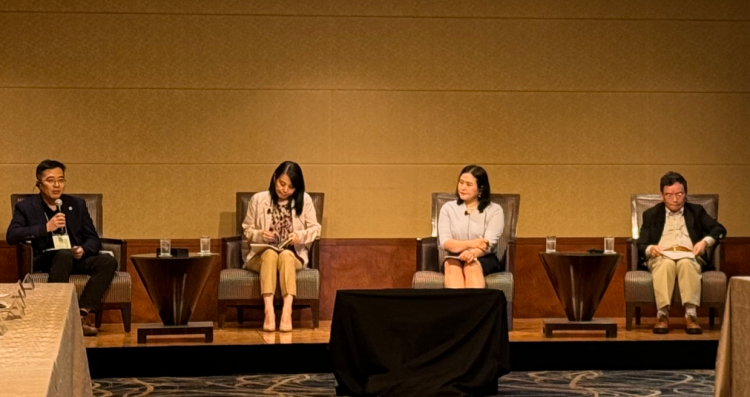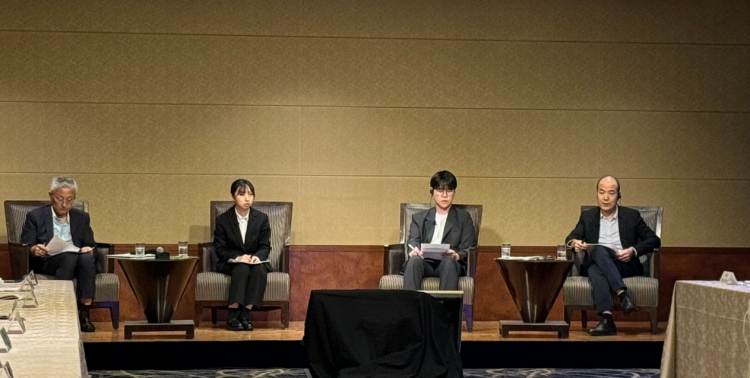Enhancing Trilateral Cooperation Amid Shared Economic Challenges——The 12th CJK Cooperation Dialogue Held in Tokyo
On August 22, 2025, the 12th CJK Cooperation Dialogue was held in Tokyo, Japan. The Dialogue was hosted by Japan Economic Foundation (JEF), co-hosted by China Institute for Reform and Development (CIRD), and East Asia Foundation (EAF), with special support of Trilateral Cooperation Secretariat (TCS). Under the theme “Enhancing Trilateral Cooperation Amid Shared Economic Challenges,” scholars from China, Japan, and ROK held in-depth exchanges and dialogues on topics of common interest, including strengthening rules-based free trade in East Asia, trilateral collaboration on climate change and energy technologies, and opportunities for CJK cooperation in tourism enhancement.

At the Opening Remarks session, Professor Chi Fulin, President of CIRD, delivered a speech titled “CJK Free Trade Agreement: The Optimal Choice Amid Common Challenges”. Professor Chi pointed out that the CJK Free Trade Agreement (FTA) is the optimal option for advancing regional economic integration, for promoting RCEP regional cooperation, and for responding to current practical needs. He emphasized the importance of building on RCEP and making full use of its framework to expedite the conclusion of the CJK FTA. Professor Chi proposed that the three countries should work toward a trilateral FTA arrangement that exceeds the standards of RCEP, accelerate mutual market openness, and strengthen trilateral working-level mechanisms. He also suggested that a CJK Leaders’ Summit be convened within the year and called for think tanks of the three countries to play a greater role in this process.
Masakazu Toyoda, Chairman & CEO of JEF, noted that the world today is facing increasing unpredictability and uncertainty, making it all the more important for China, Japan, and ROK to deepen their cooperation. He emphasized that the three countries have the potential to drive Asia’s growth and play a leading role in global development. Kim Sung-Hwan, Chairman of EAF, pointed out that today’s world is confronted with challenges that are more complex and unpredictable than ever before. He stressed the significance of the three countries working together at the regional level to strengthen a rules-based free trade system in East Asia. Lee Hee-sup, Secretary-General of TCS, remarked that the world is now facing an unprecedented level of uncertainty since the end of the Cold War. He underscored the urgent need for stronger trilateral cooperation to respond to the increasingly challenging global trade environment. He also emphasized the importance of upgrading and advancing RCEP, and accelerating negotiations on the CJK FTA.
Kazushige Tanaka, Director-General for Trade Policy, Manufacturing Industries Bureau, Ministry of Economy, Trade and Industry of Japan, remarked that the world is currently undergoing tremendous waves of transformation. It is particularly important for China, Japan, and ROK to strengthen communication, share perspectives on the evolving situation, conduct in-depth analysis, and jointly explore feasible and practical actions. Guo Qiang, Counselor for Economic and Commercial Affairs at the Embassy of the People's Republic of China in Japan, emphasized that the three countries should reinforce cooperation under regional and multilateral frameworks, resume negotiations on the CJK FTA as soon as possible, deepen practical cooperation across various sectors, and broadly expand the “CJK+X” model. Jung Kyungrok, Minister Counsellor at the Embassy of the Republic of Korea in Japan, stated that the international community holds high expectations for China, Japan, and ROK to address shared global challenges. Advancing RCEP will contribute to consolidating a rules-based international trade order. Naoyuki Yoshino, Professor Emeritus at Keio University, suggested that the three countries should collaborate in data measurement, policy design, and institutional innovation to jointly build a more transparent, efficient, and enforceable regional emissions reduction mechanism.
Session 1 of the Dialogue focused on “Strengthening Rules-Based Free Trade in East Asia: Implications of US Policy,” and was moderated by Naoyuki Haraoka, Executive Managing Director of JEF.

Kiyotaka Morita, Director of the International Affairs Bureau at Keidanren (Japan Business Federation), stated that RCEP has already played an important role in enhancing supply chain resilience. Going forward, he emphasized the need to further utilize RCEP by accelerating the negotiation process of the CJK FTA. Ahn Choong-Yong, Distinguished Professor at Chung-Ang University, noted that in the context of the “Trump round” and increasing fragmentation, East Asia must uphold the core principles of the WTO and strengthen the existing frameworks of regional cooperation. He stressed the importance of better coordination between the region’s two major FTAs—RCEP and CPTPP—and called for the resumption of the CJK FTA negotiations. Zhang Yunling, Member of the Chinese Academy of Social Sciences, pointed out that the driving force of regional economic dynamism lies in the supply chain, and that the progress of rules-based RCEP plays a central role in sustaining this vitality. However, the unilateral approach taken by former U.S. President Trump has fragmented the East Asian integration framework. RCEP members have been compelled to accept divergent rules, which has significantly undermined the integrity of RCEP’s rules of origin. He emphasized the urgent need to defend rules made by East Asian countries—especially RCEP’s rules of origin—and called for the early launch of an East Asian economic cooperation initiative and related commitments.
Kenta Hirami, Associate Professor at University of Nagasaki, emphasized that in the medium to long term, it is necessary to upgrade RCEP rules, expand its membership, and accelerate the negotiations for the CJK FTA. In the short term, he suggested that the three countries enhance cooperation in areas such as trade remedies. Strengthened coordination among China, Japan, and ROK in these domains would be an effective response to shared challenges. Jeong Hyung-Gon, Senior Research Fellow at the Korea Institute for International Economic Policy (KIEP), stated that if East Asia succeeds in building a rules-based cooperation mechanism, it could not only secure a more institutionalized position in the global trade landscape but also maintain a certain degree of leadership in the future. Zhao Jinping, Vice President of China Association of Trade in Services, pointed out that protectionism has already exerted a considerable negative impact on regional cooperation among China, Japan, and ROK. He noted that the three countries have been victims of U.S. tariff policies, and urged that they should not become perpetrators themselves—having suffered from trade protectionism, they should avoid passing such harm onto other economies.
Session 2 of the Dialogue focused on “Trilateral Collaboration on Climate Change and Energy Technologies,” and was moderated by Guo Yanjun, Professor of the Institute of Asian Studies at China Foreign Affairs University.

Naoko Doi, Senior Research Director and Assistant Director of the Climate Change and Energy Efficiency Unit at the Institute of Energy Economics, Japan, noted that the three countries have significant potential for cooperation—whether in transitioning from fossil fuels to non-fossil energy, improving energy efficiency, or enhancing demand-side management. Moon Seung-Hee, author of The Era of Climate Technology and Energy Business, suggested that instead of following regulations dominated by the West, China, Japan, and ROK should form a group-led policy framework, creating an alliance of growth and leadership. She proposed active implementation of climate finance and green finance, and the establishment of a trilateral carbon market. Zhou Weisheng, Distinguished Professor at Zhejiang University and Director of the Research Institute of Global 3E, proposed the creation of an East Asia low-carbon community. He recommended deepening multifaceted exchanges among CJK friendship cities in economic, social, and environmental areas, promoting the establishment of a CJK Zero-Carbon Campus Alliance, and strengthening social and cultural connectivity among the three countries.
Miyuki Nagashima, Senior Researcher of Systems Analysis Group of Research Institute of Innovative Technology for the Earth (RITE), emphasized that three key pillars—emissions trading systems, Asia’s voluntary carbon markets, and cooperation on energy technologies—are highly interdependent and mutually reinforcing. Choi Yong-Hwan, Head of ESG Research Team of NH-Amundi Asset Management, stated that China, Japan, and ROK need to strengthen cooperation in areas such as voluntary carbon markets, carbon credit verification, and the development of high-quality emissions reduction technologies. He called for enhanced sharing of best practices to jointly promote the sound development of a regional carbon market. Kuang Xianming, Vice President of CIRD, highlighted the vast potential and strong demand for trilateral energy cooperation. He noted the increasing complementarity of energy supply and energy transition efforts within the RCEP region and stressed the importance of fully utilizing the provisions of RCEP. He proposed that energy cooperation serve as an entry point for China, Japan, and ROK to work together in upgrading the RCEP framework.
Session 3 of the Dialogue, titled “Trilateral Opportunities in Tourism Enhancement,” featured a youth dialogue among participants from China, Japan, and ROK. The session was moderated by Kim Taehwan, Professor Emeritus at the Korea National Diplomatic Academy.

Miho Hamazaki, a Master’s student in the International Tourism Studies program at Toyo University Graduate School, suggested three key areas for promoting trilateral tourism cooperation: first, improving the accessibility of tourism destinations by addressing transport connectivity issues; second, optimizing multi-destination travel routes; and third, reducing the psychological distance among the peoples of the three countries. Kang Min-Jae, Global Asia Fellow of EAF, recommended the effective use of tourism-related video content to enhance people-to-people exchanges among the three countries. He proposed that national tourism organizations and local governments jointly support creators by offering access to local experiences and interview opportunities, and by assisting with the production of multilingual subtitles. Guo Da, Executive President of Hainan Institute for Free Trade Port Studies, suggested taking the creation of a “CJK Tourism Economic Cooperation Zone” as a breakthrough point in the CJK FTA negotiations. He emphasized promoting policy coordination and accelerating the alignment of market supervision standards, mutual recognition of professional qualifications, and cooperation in the design and sales of tourism services. He also highlighted the active role that young people can play in this process.
 中改院
中改院
 官方微信扫一扫
官方微信扫一扫 官方微信扫一扫
官方微信扫一扫